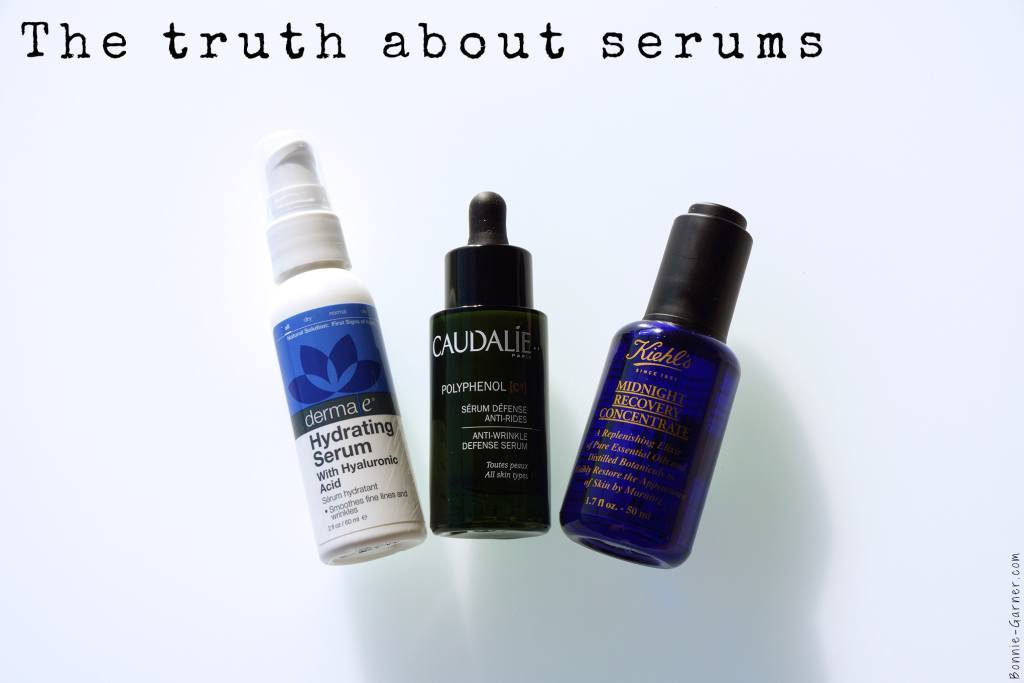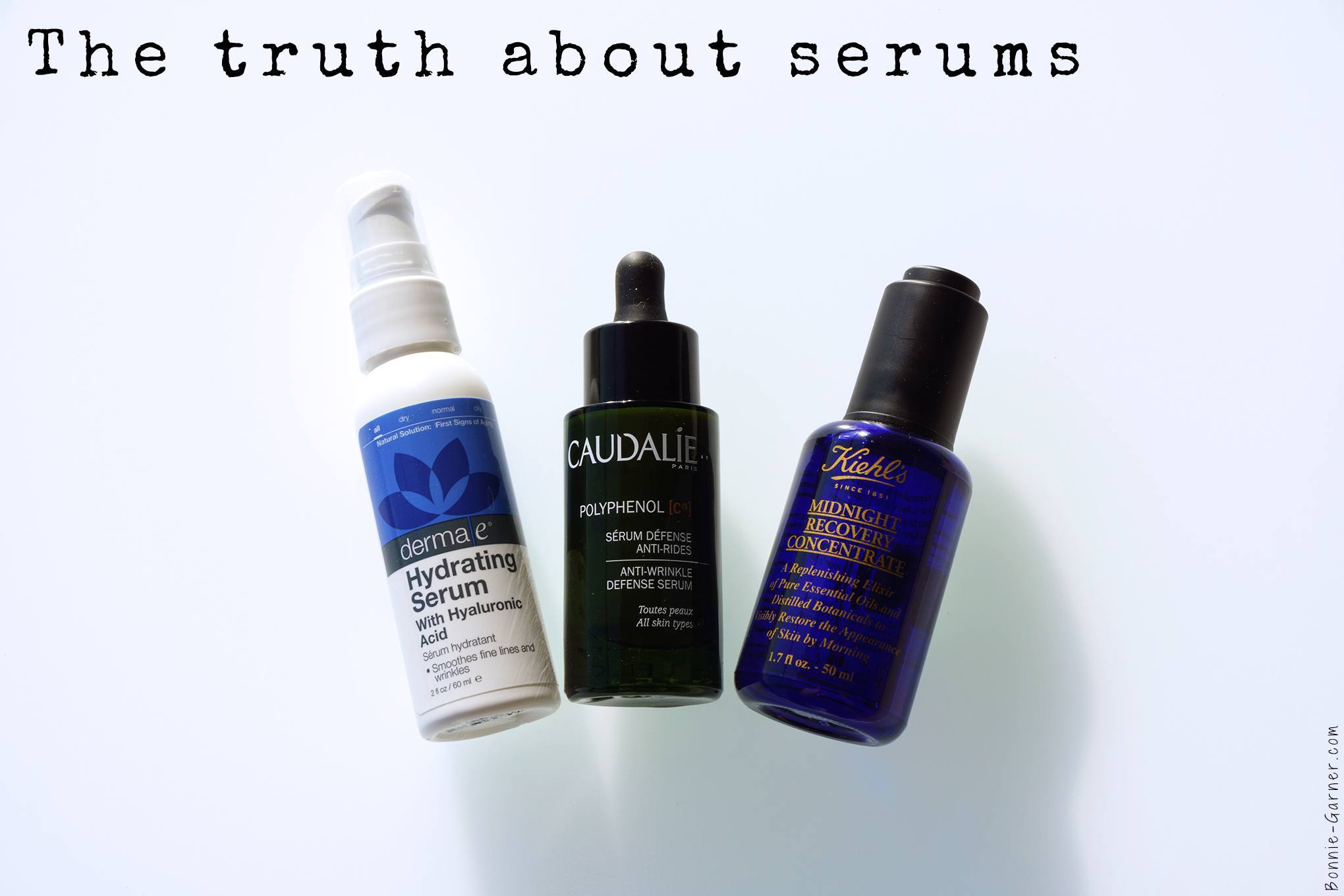Skin perfecting serum, anti-aging serum, hydrating serum, foundation serum… Quite confusing, isn’t it?
Serums are more and more accessible but they’re also somewhat a cash cow for cosmetics laboratories. You can find all kind of serums, but can they all really be considered a “serum”?
A foundation serum like the last Dior, what is it exactly? A serum or a foundation?
And concentrates, elixirs, beauty oils, can they also be considered serums?
And above all, do you really need a serum?
Today, I’ll try to give you a clearer understanding even if you feel dizzy with so much information and it’s sometimes quite confusing, I know.
A little history…
The use of serums has evolved so much recently.
Originally, the first face serums mainly targeted women with “mature skin” (gasp this term is so ugly) for a very specific anti-aging action.
The highly acclaimed Advanced Night Repair by Estée Lauder and the Double Sérum by Clarins were both born in the 80s.
But these last 5 years, brands understood the attracting power of these little bottles which often look so much like pharmaceutical vials, promising almost magical properties. So brands set out to create serums for your skin’s every little need.
Now, everyone can add a serum to their care routine. There are all kinds of serum, and for all budgets!
But what exactly is a serum and how should you use it?
A face serum has a rather fluid texture. The concentration in active ingredients is more important than a regular moisturizer and it’s also much more efficient.
The texture is fluid because it facilitates the deep penetration of active ingredients (more than a regular moisturizing cream).
However, although it penetrates into the skin very well, it may not be enough to protect it and that is why it’s often paired with a moisturizing cream (applied after the serum). This cream will moisturize and protect the skin.
Serums are often more expensive than creams, due to the concentration of higher active ingredients.
The purpose of a serum is to give the skin a little boost.
So, it’s usually used as a treatment (at each change of season, for example) or occasionally (in case of fatigue, stress, or after sun exposure…) and for a period of 1 to 3 months (to see any real result on your skin).
But you can also use them every day to treat a specific “everyday” needs (such as dehydration, or ageing signs for example).
For a treatment or an occasional use, it’s better to apply the serum in the evening before your night cream. Overnight treatments are so much more effective because the skin renews itself and the cell activity is very important while we’re sleeping.
Which kind of serums exist on the market?
A lot! wink
Some serums will treat the skin. They’re very specific:
– moisturizing serums for dehydrated skin,
– nourishing ones for dry skin,
– soothing for sensitive skin,
– purifying for oily and/or acne prone skin,
– brightening for dull or tired skin,
– anti-dark spots for hyper-pigmentation,
… and I have forgotten many others!
They can be used on a daily basis (every day) or as a treatment, regardless of your age.
Other face serums can complete a skincare routine when the skin has become more demanding. This is the case for example of different anti-aging serums that you can start applying at the age of 30.
– antioxidants serums (which preserve youthful skin),
– anti-wrinkle serums,
– lifting serums,
– global anti-age serums (they’re basically doing everything: moisturizing, nourishing, anti-wrinkle, firming, anti-dark spots… They’ll also do your ironing and a coffee if you ask nicely;) )
They can be used every day on a daily basis, morning and/or evening.
At what age is a serum effective?
Ah ah, now that’s a tricky one!
According to any cosmetic brand’s marketing teams, the answer would probably be: “But at any age, my dear!”
In my opinion, it depends, on your skin’s needs, your skincare habits (you love taking care of your skin and you’re interested in it or you don’t have time) and of course on your budget.
Before 35 *, using a serum is only useful if your skin has a specific need and I don’t personally think it’s necessary to use it all year round. 2 to 4 times a year is already a very good rhythm.
(* I say 35, but it could be 30, it could be 40, that’s when you feel your skin is changing and more “tired” than before)(at 36, I’m totally experiencing this feeling)(oh joy)
After 35, I find it’s a shame not to use a serum because these skincare products have the highest concentration of active ingredients. And, let’s not deny it, your skin after 35 is more demanding!
For me, it’s better to invest a little more in a good serum, even if you then buy a cheap moisturizing cream.
The cream is mainly intended to form a protective layer on the skin. The penetration of active ingredients is quite limited with a moisturizer. So investing a crazy amount of money in your day cream isn’t really worth it!
What is the difference between a serum and an skin elixir or a concentrate?
The difference is in the way you use the serum.
A serum is usually applied under a cream, never on it’s own.
A skin concentrate or elixir comes in different forms: either very liquidy or oily textures.
Generally, you can add a few drops directly into your skincare cream to give it a little boost.
Or, and this is more the case with oily formulas, it can be applied alone, like Kielh’s Midnight Recovery Concentrate, for example …
In all cases, a quick look at the directions for using it in the packaging insert should help you! wink
Can face beauty oils be considered a kind of serum?
There are differences of opinion on this topic!
I personally see them as kinds of elixirs that can boost the skin when they’re used with a cream.
But of course, there are lots and lots of different oils: simple vegetable oils, mixtures of different oils, face oils with essential oils added….
I will probably have to write a new blog post on the subject some day! wink
And what about all those Skin perfecting serums?
Yes, what about all these serums which popped up a few years ago promising us a perfect, very soft, bright skin (and without any pores)? Like a ‘Photoshop skin‘?
It’s easy to find some examples because skin perfecting serums have been quite popular recently: Lancôme Visionnaire, Idéalia by Vichy or Youth Code by L’Oréal Paris…
For me, these ‘serums’ are clearly not serums.
I see them more as a makeup product, like a primer that gives you a smooth finish to the skin in order to apply the foundation better. But applying any skincare products after this kind of product would be totally useless.
These products’s formula is full of silicone. Thanks to them, the skin is covered with a thin layer of product which gives this very smoothing effect, like a “my skin but better” effect.
The issue is that with such a large amount of silicone in the formula, I have big doubts about the penetration efficiency of the other ingredients in the formula… and clearly, for the same reason, I don’t really see the point of then applying a moisturizing cream on top.
Silicones (in terms of size) are big ingredients and therefore usually, they will remain on the surface of your skin (when you have a lot of them in a formula). That’s why you’ve got this very soft and “plastic skin” feeling. Your skin is just “filled” with silicone.
The flip side is that other active ingredients, which are supposed to go deeper in the skin, will remain in the skin’s surface too. And it’s such a waste…
So yes, the fact that this kind of product should ever be considered in the skincare category does not really making any sense to me… because it’s clearly more of a makeup product than a real skincare treatment.
However, I saw that this concept was recently launched in organic brands, and for once, I would be very curious to know what these organic “skin enhancers” have in their formulas… (no place for silicone I guess!)
I will try to find one a do a review for you if you want! wink
And foundation serums, what about them?
It’s the new “it-foundation”! Since serums are making it in the skincare ranges, why not duplicate the concept in makeup?
So suddenly, all foundation products packaging are some kind of bottle with dosing syringe and the formulas are enhanced with skincare ingredients… And all this in a very fluid form, just like a serum (of course)!
Some examples: Fusion Ink foundation by YSL or the latest Diorskin Serum Foundation Nude Air by Dior.
No doubt here, these are foundations!
Why not?
Perfecting the skin is totally something I want from my foundation. The fact that it’s lightweight and will cover my skin to make my pores (or my wrinkles) disappeared is clearly a bonus!
Come here, little Diorskin Nude Air, come to Mama… wink
In conclusion:
Serums are a huge trend now in cosmetics!
Many so called serums really have nothing to do with skincare but everything to do with makeup.
So, if you want to add a serum to your skincare routine, don’t forget to take a look at the composition because as you’ve seen, the word “serum” can sometimes really be misleading…
And you, are you a serum user? Which one is your favorite?
Photo credits: Dior.com, bonnie-garner.com
Cet article est aussi disponible en français: La vérité sur les sérums



